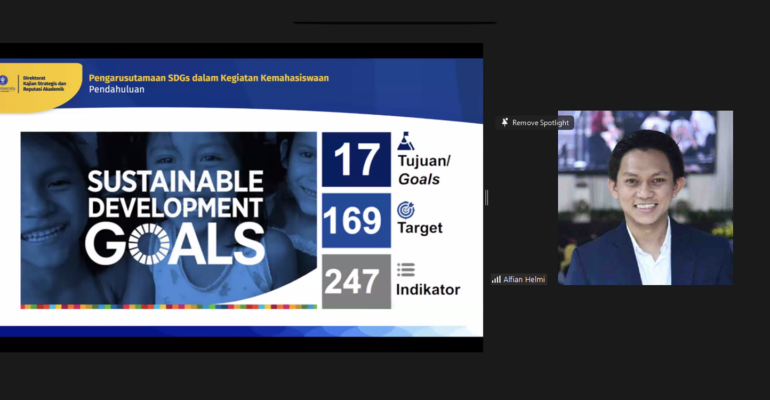Preparing for KKNT Innovation, IPB University Students Get Debriefing on Sustainable Development Concepts

IPB University provided a second debriefing for students of the Thematic Real Work Lecture (KKNT) Innovation before going into the community. Public health and social entrepreneurship to achieve sustainable development were the topics of discussion in this debriefing lecture.
Assistant Director of Strategic Studies (KSRA) IPB University, Dr Alfian Helmi opened the briefing material by conveying the basics of Sustainable Development Goals (SDGs).
In practice, to achieve sustainable development, students can work together with other stakeholders, such as community organisations, businesses, as well as government and parliament.
“Once in the field, don’t work alone. Involve the local government, community organisations, media, and entrepreneurs. Because sustainable development is a joint effort,” Dr Helmi explained.
KKNT Innovation students, as academics, directly play a role in providing progressive thoughts and innovations to support regional development. Therefore, he said, students need to understand the village in designing KKNT Innovation activities, by making in-depth observations.
“Observation can be done in the first two weeks, so that students can understand the problems and needs of the community, so that the programme designed later will be in accordance with the social, cultural and environmental conditions of the village community,” he added.
Furthermore, IPB University’s Faculty of Medicine Lecturer, Dr Yusuf Ryadi, MKM briefed KKNT Innovation IPB University students on the application of public health principles. This material aims to make students able to contribute in improving the awareness and quality of life of the community.
“They are expected to create health programmes that reach all levels of society, including the elderly, toddlers, school-age children, disabilities and pregnant women,” said Dr Yusuf.
Some of the KKNT Innovation programmes that can be carried out include counselling and education, free health checks, the formation of Community Health Cadres, and the construction of hygiene facilities.
In addition, maintaining personal health during the KKNT Innovation also needs to be considered. Adopting a healthy lifestyle is one way to maintain physical and mental health. Students must also prepare first aid kits and personal medicines needed during the 40-day Innovation KKNT period.
In this briefing, Abdul Hamid, SE, MM, as a social entrepreneurship practitioner and CEO of Taman Patani also stressed the importance of analysing problems and stakeholders through field research. This is so that the solutions and programmes offered can be sustainable.
“Like what Mr Alfian has said, students can look for influential people (opinion leaders) first, before contacting government agencies. This step is to help formulate social problems, understand the needs, context, and challenges faced,” Hamid explained.
He also hopes that KKNT Innovation IPB University students will be able to become inspirators, incubators, and executors who bring IPB University innovations to encourage social entrepreneurship in rural communities, as an effort to achieve “socio-economic resilience”.
“The development of digital-based marketing carried out by IPB University, as has been done during KKNT Innovation activities or its integration in the OVOC and Desa Sejahtera Astra programmes, has proven to be able to help develop the community’s economy through social entrepreneurship,” concluded Hamid, closing the material at this second briefing lecture. (*/Rz) (IAAS/RSL)



